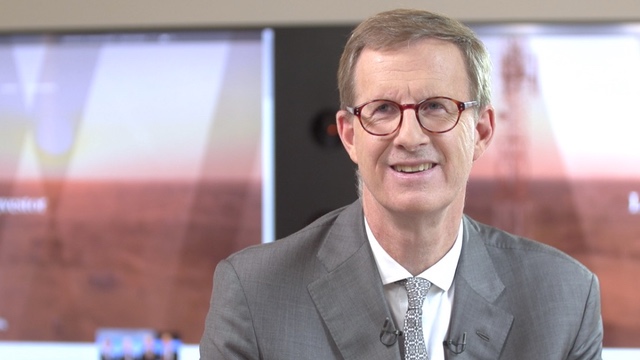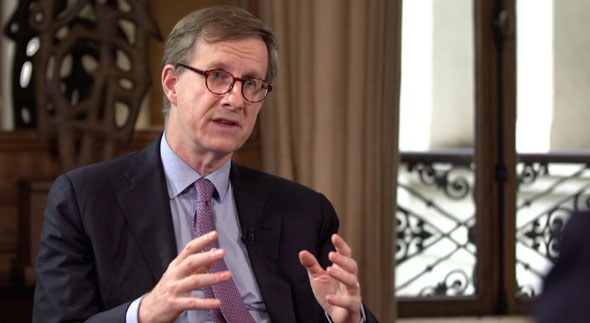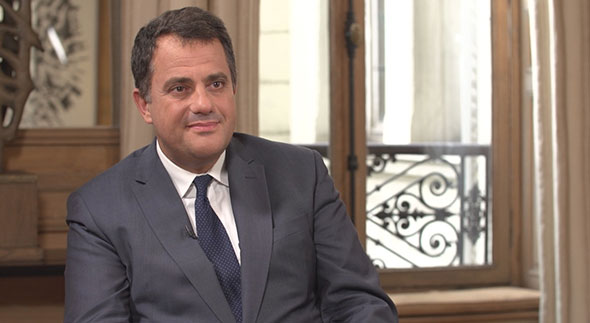Eurobusiness Media (EBM): Wendel, one of Europe's largest listed investment companies, reports results for the first half of 2013. Frederic Lemoine, welcome. You are the Chairman of the Executive Board of Wendel. H1 of this year kicks off the 2013-2016 period which will be focused on internationalization and diversification. Could you remind us of some of the highlights of this strategic orientation?
Frédéric Lemoine: It’s true that this first half of the year is in fact the first half of our new strategy. For four years we have been focused on decreasing the debt that was too high for Wendel, selling some assets at a good price and in good conditions. I think we did reasonably well on that front and we started very cautiously to invest in new companies. Now the focus is really to invest bigger amounts. We said we would invest €2 billion between the beginning of this year and the end of 2016 and that we would do that one third in Europe, where we know well the environment, be it in France and Benelux or in Germany, one third in Africa, which is new for us, but which we believe is very promising for the long term, and one third in North America. We started this some months ago. We made our first investment in Africa, with IHS, a tower telecom company present in Nigeria, Côte d’Ivoire and Cameroon. This is very exciting, we made already three capital increases in the company, it’s a very quick growth. We again made a third tranche of $100 million in July, bringing our investment to $276 million. So it’s well started in Africa and in North America we have just opened an investment office in New York, hiring American professionals to work with the very experienced Managing Director that we sent there. So it’s moving quite quickly in this new direction and of course, we carry on developing our existing portfolio.
EBM: The net asset value, NAV, is a key indicator for the value creation of an investment company. You have announced that Wendel has hit a record NAV of €136.4. How do you explain this performance?}
Frédéric Lemoine: We are very proud to have this record high NAV per share, because it means that we have restored, actually more than restored, the value that Wendel had reached before the financial crisis, the intrinsic value of Wendel, of its assets, of course netted by the debt we have and the liabilities we have. So that’s a good result in itself. This is due of course to the quality of our companies, to the work we’ve done to develop them, notably in the emerging companies. It’s also due more precisely to the increase of the stock market recently, because we always valuate our assets compared to their listed valuation for listed assets, or compared with the valuation of the traded comparables of our unlisted assets. So it can go up and down depending on the evolution of the stock market, but the trend is clear and we can do much higher than that in the future.
EBM: What are some of your key takeaways concerning your first half results?
Frédéric Lemoine: These first half results are good. We are happy with them. We believe that a net result group share of €323.4 million is a good result. It was higher last year, but the comparison has to take into account the fact that the perimeter is not the same. Last year we had Deutsch, we had Legrand, with a higher stake for the full first half. And as far as non recurring revenues are concerned, last year we had a big capital gain with the sale of Deutsch for €690 million. This year we had another nice capital gain of €370 million, but of course lower than last year’s. So in absolute terms, the only disappointment we have is that the result from business activity has been reduced at constant perimeter by 7.5% and this is due to the decrease in the contribution from Saint-Gobain, which has decreased by 35%.
EBM: And what are some of your main takeaways from the group companies’ news flow in the first half?
Frédéric Lemoine: They’ve done really well in a very contrasted environment. Of course, Europe has not been in great shape since the beginning of the year. Our companies have played well in this environment. Even in France, Parcours for instance has grown by 6%, which is a nice result. And most of them are very exposed to emerging companies which have brought higher growth rates; 12.8% growth in emerging markets for Materis, strong growth for Stahl, for Bureau Veritas, offsetting somehow poorer performances in Europe. And even when the total growth has been declining, we are very satisfied by the fact that some of our companies have managed to increase their EBITDA. This is the case of Stahl in the Netherlands or with Materis Paints, the decorative paints division of Materis. They have seen their sales declining by somehow 4/5% and their EBITDA growing by 7/8%. This is impressive. This is due to long-term cost reduction plans that have been well implemented, a strict operational discipline that we foster in all our companies. We are not very satisfied with the H1 results of Saint-Gobain. Of course the decline by 15% of the operational income is not something that one can be satisfied with. The management of Saint-Gobain did well in terms of maintaining their prices, even increasing their prices, reducing their costs, being cautious with their investments. The environment was not good. Probably we reached the bottom. We expect the company to reach its objective to rebound in H2. We hope for that because we absolutely want the strategy of Saint-Gobain to carry on being implemented quickly and efficiently.
EBM: Can you share with us today an update about the option to sell a business of Materis in the short to medium term?
Frédéric Lemoine: Yes. It’s really on top of our mind these days, because two days ago – today is August 29th - two days ago we launched the sale process of Parex, the mortar division of Materis. We received a lot of letters and phone calls, from financial players, from trade buyers that would be interested in acquiring Parex. And it’s true that Parex has done extremely well. They are world leader in mortars, they have grown by 7.5% in the first half of the year. Their profitability was in line, growing at that pace and they are very present in China, in other emerging countries, they are exposed to the rebound of the construction market in the US. So we have decided to organise a process so that all these interests can be compared, they can make some due diligence in a formal way and we expect to get both a very good buyer for Parex and for Parex teams, and a very good price for the shareholders at the end of this process, probably at the beginning of 2014.
EBM: And lastly, what is your comment on the discount to your share price which remains significant?
Frédéric Lemoine: It is, it’s above 35%, which is a big discount. My first reaction is that we want to take advantage of that and that’s the reason why we have bought - consistently and continuously - we have bought back shares. We have just cancelled 2% of our capital yesterday, so that this discount can be given back to our existing shareholders. So pro-forma of this shares cancellation, our NAV per share wouldn’t have been 136.4, but 137.3 euros per share, so this additional marginal increase is due to the cancellation. We would like the discount to narrow, closer to its historic average. This is up to the market to decide. What I see is that the share price today is about €92/93. It was €15 in March 2009.
Frédéric Lemoine, Chairman of the Executive Board of Wendel, thank you very much.
Frédéric Lemoine: Thanks to you.





